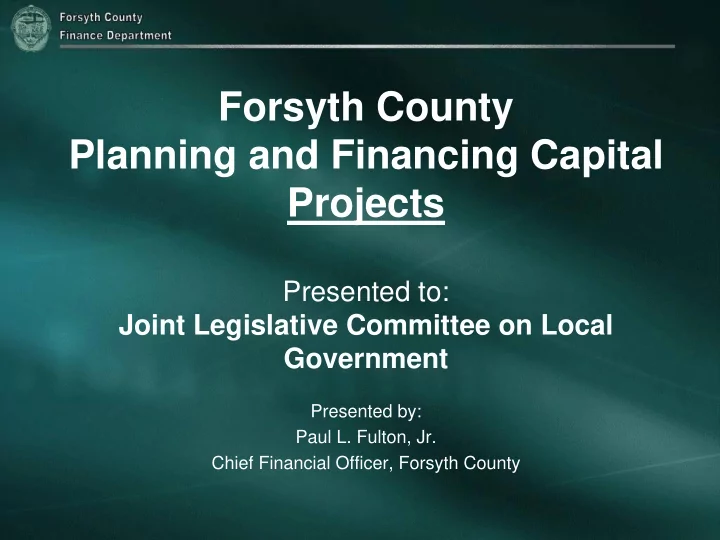

Forsyth County Planning and Financing Capital Projects Presented to: Joint Legislative Committee on Local Government Presented by: Paul L. Fulton, Jr. Chief Financial Officer, Forsyth County
Forsyth County, North Carolina Why Issue Debt? • To provide necessary assets when they are required. • To promote intergenerational equity by matching up assets’ useful lives with the cost to the citizens for the assets. • To provide as stable a tax rate as is possible.
Forsyth County, North Carolina Debt Principal Outstanding as of June 30, 2011 • General Obligation Bonds – $530,850,000 • Certificates of Participation and Limited Obligation Bonds – $73,910,000
Forsyth County, North Carolina Bond Ratings • Aaa – Moody’s Investors Service Since 1996 • AAA – Standard and Poor’s Since 1997 • AAA – Fitch Investors Service Since 1997 • North Carolina Municipal Council – 91
Forsyth County, North Carolina Capital Improvement Program For the year ended June 30, 2013 • Current Program p roposes capital expenditures over the next ten years of $455,152,000. • Includes debt service (principal and interest) cost projected over the life of any debt proposed. • Includes estimates of increased operating expenditures, if any. • Projects typically appear in the plan 5 to 10 years before they are undertaken.
Forsyth County, North Carolina Capital Improvement Program For the year ended June 30, 2013 (Cont.) • Project conception and scope may include the school system, community college, sheriff and other county departments, interested citizen groups, etc. • Most debt is voter approved, full faith and credit general obligation bonds. • Certificates of Participation and Limited Obligation Bonds are generally reserved for public safety, administrative and critical service areas.
Forsyth County, North Carolina Capital Improvement Program For the year ended June 30, 2013 (Cont.) • Pay-go funding, when available from positive outcomes from the previous year, is generally directed to small projects across all service areas. • Short term (less than five years) financing is limited to computer networking and server acquisitions in the CIP. • The County has an ongoing program to identify land and buildings which may be surplus and available for sale or exchange to meet future space needs.
Forsyth County, North Carolina Capital Improvement Program For the year ended June 30, 2013 (Cont.) Planned sources for the current Capital Improvement Program: General Obligation Bonds $313,150,000 Limited Obligation Bonds 118,400,000 Pay-Go 1,902,000 Short-term financing 4,700,000 Sale or exchange of assets 17,000,000 Total Sources $455,152,000
Forsyth County, North Carolina Capital Improvement Program For the year ended June 30, 2013 (Cont.) Excerpt from the Forsyth County Debt Policy: “total annual debt service, less revenues restricted to debt service (including, but not limited to, federal payments related to “Build America Bonds” and “Qualified School Construction Bonds” and state lottery proceeds) shall not exceed 15% of the appropriations in the annually adopted budgets as shown in the budget ordinance.”
Forsyth County, North Carolina Capital Improvement Program For the year ended June 30, 2013 (Cont.) • Education debt leveling plan for last two referenda: • School bonds of $250,000,000 • Community College bonds of $25,000,000 • Joint School and Community College bonds of $62.115,000 • Funded with 4.1¢ tax rate increase and lottery proceeds over a 23 year period beginning in 2007 with the promise of no further increases in taxes to pay these bonds off.
Forsyth County, North Carolina Debt Issuance Team and Process Board of County Commissioners and staff • Plan and execute actions and documents required. Public via referendum or public hearing • Vote and/or provide input. Bond Counsel • Provides legal guidance to County. Financial Advisor • Provides structural and financial guidance to County. Underwriter • Buys competitively or negotiates price.
Forsyth County, North Carolina Debt Issuance Team (cont.) Local Government Commission/Treasurer’s staff • Ensures compliance with general statutes related to issuance. • Assesses project necessity and type of financing proposed as well as financial position and current and proposed taxing and debt levels. • Coordinates calendaring of approvals and sales dates. • Provides market quality control on individual sales. • For infrequent issuers; provides technical assistance throughout the process. • Ultimately approves or denies a unit’s application. Bond Rating Agencies • Provide independent review and objective creditworthiness assessment for the investing public.
Forsyth County Planning and Financing Capital Projects Questions?
Recommend
More recommend